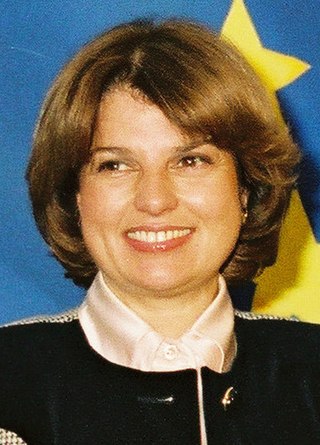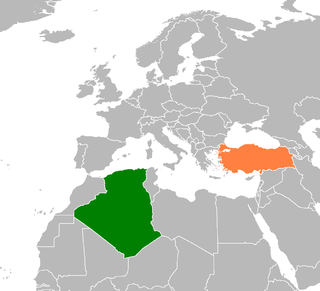The Republic of Turkey was created after the overthrow of Sultan Mehmed VI by Mustafa Kemal Atatürk in 1922 by the new Republican Parliament in 1923. This new regime delivered the coup de grâce to the Ottoman state which had been practically wiped away from the world stage following the First World War.

Sami Süleyman Gündoğdu Demirel was a Turkish politician, engineer, and statesman who served as the 9th President of Turkey from 1993 to 2000. He previously served as the Prime Minister of Turkey seven times between the years 1965 and 1993. He was the leader of the Justice Party (AP) from 1964 to 1980 and the leader of the True Path Party (DYP) from 1987 to 1993.

Tansu Çiller is a Turkish academic, economist, and politician who served as the 22nd Prime Minister of Turkey from 1993 to 1996. She was Turkey's first and only female prime minister. As the leader of the True Path Party, she went on to concurrently serve as Deputy Prime Minister of Turkey and as Minister of Foreign Affairs between 1996 and 1997.

The Welfare Party was an Islamist political party in Turkey. It was founded by Ali Türkmen, Ahmet Tekdal, and Necmettin Erbakan in Ankara in 1983 as heir to two earlier parties, National Order Party (MNP) and National Salvation Party (MSP), which were banned from politics. The RP participated in mayoral elections at that time and won in three cities Konya, Şanlıurfa, and Van. Their vote percentage was approximately 5%.

The 1980 Turkish coup d'état, headed by Chief of the General Staff General Kenan Evren, was the third coup d'état in the history of the Republic of Turkey, the previous having been the 1960 coup and the 1971 coup by memorandum.

Necmettin Erbakan was a Turkish politician, engineer, and academic who was the Prime Minister of Turkey from 1996 to 1997. He was pressured by the military to step down as prime minister and was later banned from politics by the Constitutional Court of Turkey for allegedly violating the separation of religion and state as mandated by the constitution.

The multi-party period of the Republic of Turkey started in 1945.

Millî Görüş or Erbakanism is a religious-political movement and the ideology of a series of Islamist parties inspired by Necmettin Erbakan. It argues that Turkey can develop with its own human and economic power by protecting its core Islamic values and combating European imperialism. Multiple political parties in Turkey adopted the ideology, such as New Welfare Party, Felicity Party, Virtue Party, Welfare Party, National Salvation Party and National Order Party. Recep Tayyip Erdoğan, a lieutenant of Erbakan, founded the Justice and Development Party, which has governed Turkey since 2002.

General elections were held in Turkey on Sunday 24 December 1995, triggered by the newly re-established Republican People's Party's (CHP) withdrawal from a coalition government with the True Path Party (DYP). The coalition had been in government for four years, having been formed by the Social Democratic Populist Party, the CHP's predecessor.

Algerian-Turkish relations refers to the diplomatic relations between Turkey and Algeria. Algeria has an embassy in Ankara, and a general consulate in Istanbul. Turkey has an embassy in Algiers. Both countries are full members of the Union for the Mediterranean.
Recep Tayyip Erdoğan, the 25th prime minister and 12th president of Turkey, was born on 26 February 1954, in Istanbul, Turkey.

Muhammed Ali Fatih Erbakan is a Turkish engineer and politician who is the founder and leader of the Islamic fundamentalist New Welfare Party (YRP). A son of Necmettin Erbakan, the former Prime Minister of Turkey who led the YRP's predecessor, the Welfare Party, he is the President of the Necmettin Erbakan Foundation.
The Batı Çalışma Grubu was an alleged clandestine grouping within the Turkish military said to be linked to the Ergenekon organization. It was allegedly set up in 1997 by General Çevik Bir as part of the process relating to the 1997 military memorandum, and active until at least May 2009. The primary activity of the group appears to have been classifying politicians, military personnel, journalists and others according to ethnic background, religious affiliation and political leanings, and to monitor the activity of those considered a potential danger to secularism in Turkey. This included monitoring some religious communities outside Turkey. It has been claimed that in 1997 BÇG had records on 6 million people, and offices in the Higher Education Board (YÖK) as well as in each branch of the military.

Hasan Celal Güzel was a Turkish journalist and politician. He was Minister of Education, Youth and Sport (1987–1989). He was leader of the Rebirth Party in the 1990s, a party he co-founded in 1992. He was a columnist for Radikal and Vatan.

The 54th government of Turkey governed Turkey from 28 June 1996 to 30 June 1997. It was a coalition government formed by Welfare Party (RP) and True Path Party (DYP), and was known as Refahyol.

İskenderpaşa Jamia or The Community of İskenderpaşa is a branch of Naqshbandiyya-Khalidiyya Ṭarīqah (Sufi Order) in Turkey.
Events in the year 1997 in Turkey.
Events in the year 1998 in Turkey.
The Lost Trillion Case, also known as the Missing Trillion Case, was an embezzlement scandal in Turkey involving the use of forged documents by the Welfare Party executives to prevent the return of Treasury grants in amount of around one trillion old Turkish lira, i.e. ₺62 million in today's currency following the ban of the party in 1998. Party leader and former prime minister Necmettin Erbakan as well as 68 party officials received prison sentences after a court trial, although the former's was commuted to house arrest.

İsmail Kahraman is a Turkish politician from the AK Party who served as the 27th Speaker of the Grand National Assembly from 22 November 2015 to 9 July 2018. He has been the Member of Parliament for Istanbul's first electoral district since 1 November 2015, having previously served as an MP for Istanbul between 1995 and 2002. He also served as Minister of Culture from 1996 to 1997 in the government of Necmettin Erbakan as a member of the Islamist Welfare Party.












